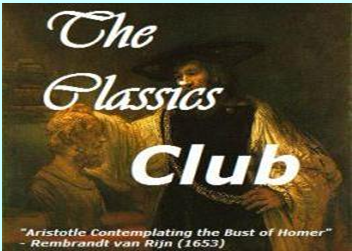The Ladies' Paradise
Emile Zola
translated by Brian Nelson
Oxford World's Classics
438 pages
The Ladies' Paradise is on my Classics Club list....Eighty-five classic books I plan to read. For more about The Classics Club, go to the web site here: http://theclassicsclubblog.wordpress.com. There are Classics Club lists to browse, events to participate in, and a Readathon coming up on January 4th.
Emile Zola's novel was published in 1883 (the French title is Au Bonheur des Dames); it is the eleventh novel in his Rougon Macquart series. I thoroughly enjoyed this novel, and now I wish I had more Zola novels on my Classics Club list. I really enjoyed The Ladies' Paradise. I liked Zola's realistic style, the sense of history, and the layers of close social observation. Mostly, though, I was simply in the grip of a really good story. The tale of an impoverished shop girl, Desnise Baudu, who is virtuous and noble, despite her poverty and lack of advantages, is emotionally involving. Denise falls in love with her employer, Octave Mouret, without any hope of her love being returned. Denise focuses first on survival, and on providing for her two younger brothers. But she has a natural business acumen, as well as a quiet beauty. She does eventually catch Mouret's eye, but any match between the two seems impossible, since they are separated by class, by Mouret's ongoing affair with a wealthy married woman, and by every other circumstance imaginable.
I don't have much to add to my previous post about The Ladies' Paradise, except to say that it is a complex and remarkably textured novel. It is both darker and more interesting than the recent BBC series (very loosely) based on Zola's novel. The character of Denise was very beautiful in her simple goodness, and Zola was unsparing in his depiction of commerce, sex, and power. The old Paris crumbles under the rise of the new Paris, and some Parisians crumble and fall, too. But Zola is not entirely critical of the new Paris, epitomized by the rise of the modern department store. I think readers will find The Ladies' Paradise to be surprisingly relevant and contemporary in feel, even as they get a glimpse into 19th century Paris.



No comments:
Post a Comment